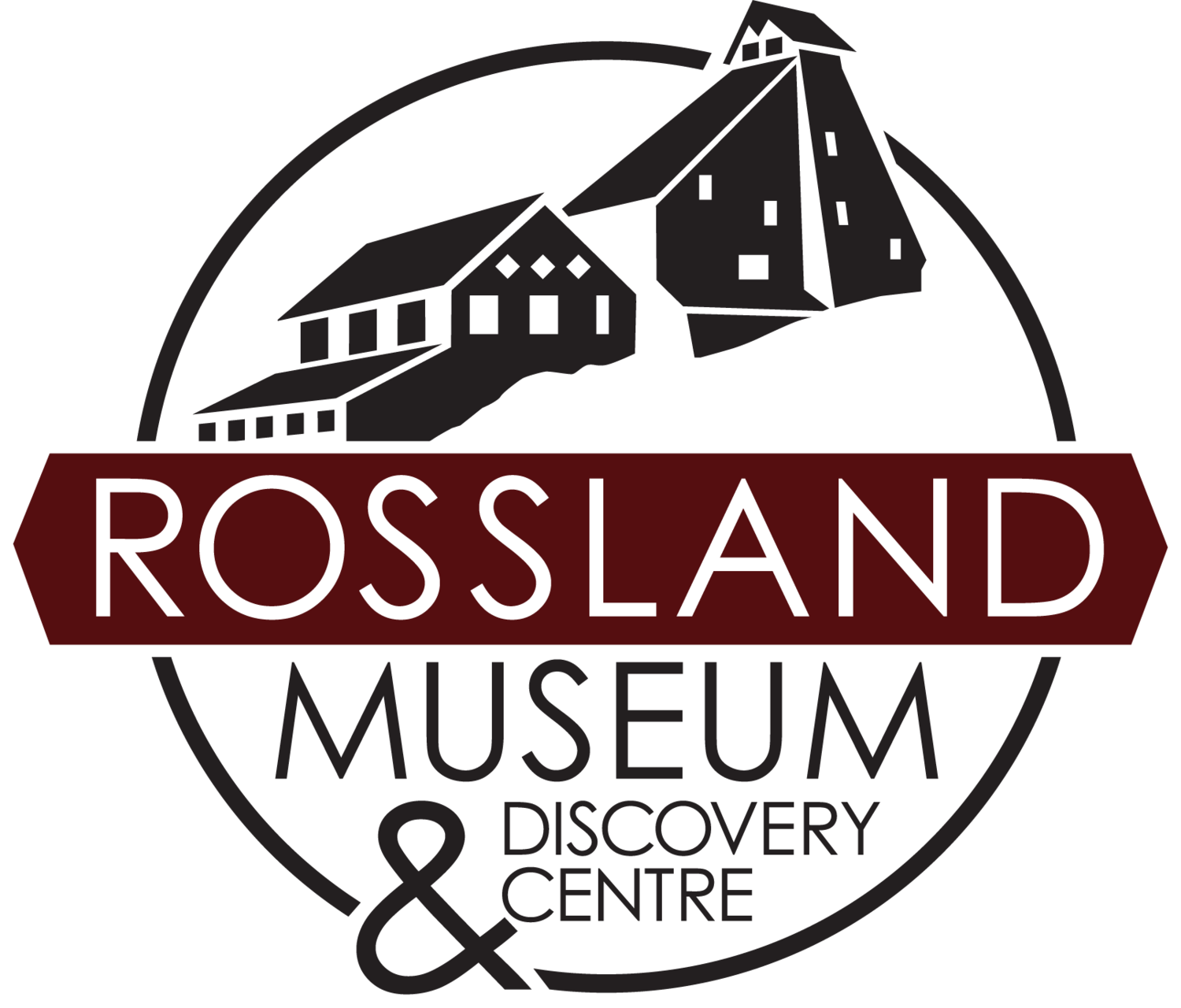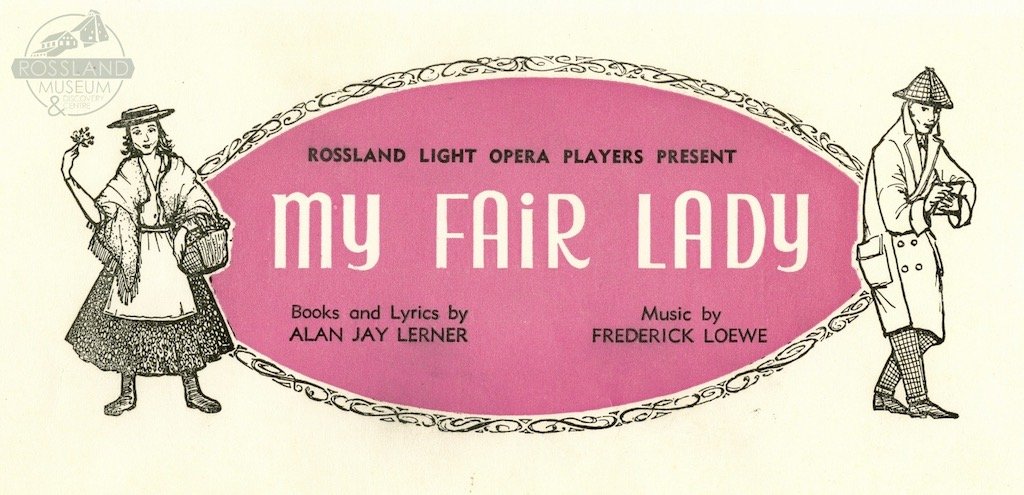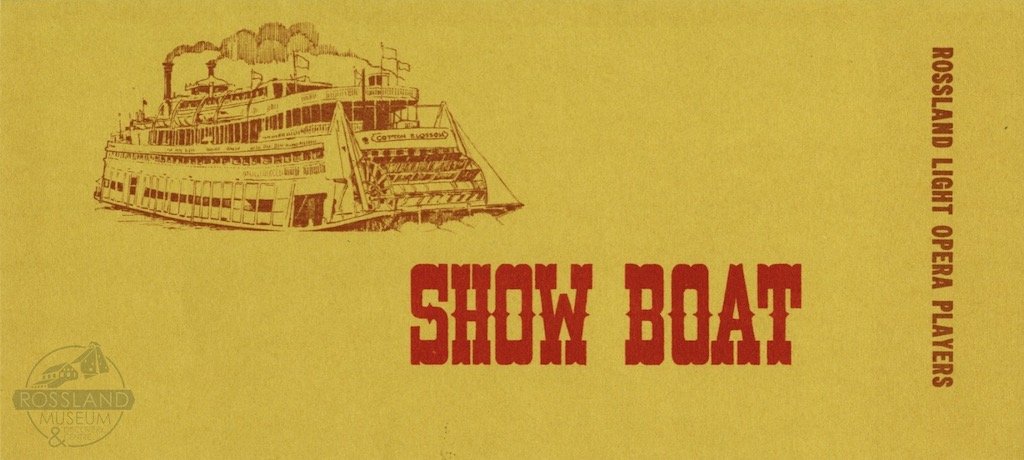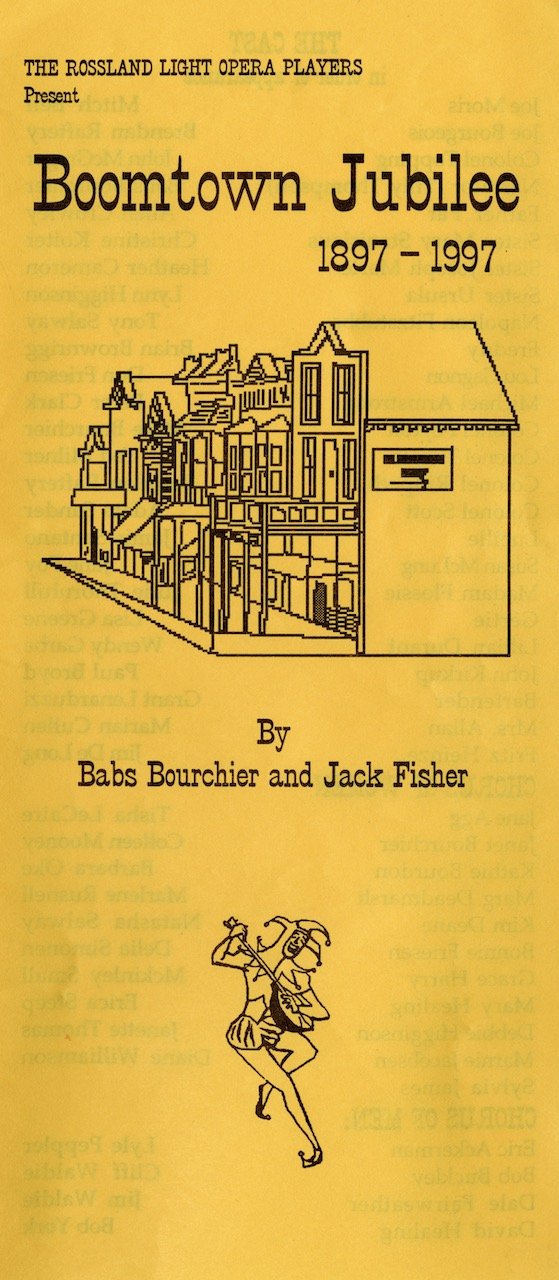Behind the Curtain: The History of the Rossland Light Opera Players
In 2021-2023, the Rossland Light Opera Players celebrate their seventy-year anniversary. To celebrate the milestone, the Rossland Museum & Discovery Centre has compiled an extensive history of the organisation, believed to be one of the longest operating amateur musical theatre groups in British Columbia!
Before the Rossland Light Opera Players
Prior to the Rossland Light Opera Players, there were other musical theatre groups in both Rossland and Trail. The Orpheus Male Choir, for example, was formed in Trail in 1937. In 1939, the Orpheus Male Choir relocated to Rossland and subsequently changed their name to the Rossland Amateur Operatic Society. The Rossland Amateur Operatic Society performed a variety of productions, notably Trial by Jury and Dominoes in Rossland’s Capitol Theatre in May 1940. The Rossland Amateur Operatic Society, however, faced membership shortages as a result of World War II. As such, the group disbanded after a final performance of H.M.S. Pinafore in April 1941 at Rossland’s Capitol Theatre. The group’s remaining assets were used to buy a $50.00 Victory Bond (approximately $950.00 in 2022). The Victory Bond would later be acquired by the Rossland Light Opera Players.
Musical Theatre Returns to Rossland
In 1951, after a nearly ten-year absence, a plan was launched to re-establish a Rossland-based musical theatre group. The plan was initiated by school teachers Bill and Kathleen Baldry, who contacted fellow Rossland teachers Gordon Griffin and Margery Littely to discuss the formation of a light opera society in Rossland. Gordon Griffin, who had previous experience in light opera (shorter in length than traditional opera), suggested Gilbert and Sullivan’s Pirates of Penzance for their first performance. Agreeing, the group published an advertisement in the Rossland Miner newspaper calling for interested individuals to attend a meeting. The response was encouraging, with many of the area’s most talented in attendance. The meeting resulted in the formation of the Rossland Light Opera Players on November 1, 1951. The previously-mentioned Victory Bond purchased by the Rossland Amateur Operatic Society in 1941, provided the initial funding needed to stage the first production. Eric Bourchier, one of the original members of the RLOP, had been the trustee of the Rossland Amateur Operatic Society. As such, he had been in charge of the Victory Bond, subsequently making it available to the RLOP.
RLOP logo, designed by George Bourchier.
For their inaugural performance, the RLOP chose Gordon Griffin as the music director and Bill Baldry as the stage director. The cast, reportedly chosen without seeing any of the actors perform on stage, consisted of Jean Ellison as Mabel, Larry Gasen as Frederick, Stan Fisher as the Pirate King, Eric Bourchier as the Sergeant of Police, Bill Baldry as Major-General Stanley, and Kathleen Baldry and Margery Littely as supporting characters. Stan Fischer, the industrial education teacher at the Rossland high school, recruited his students to help in designing the production, which included lighting, staging, flats, and music stands. The production of Pirates of Penzance opened in the Rossland high school auditorium in March 1952, performing two shows to enthusiastic audiences. The group then travelled for a show in the Trail Junior High auditorium (now called the Charles Bailey Theatre) and the Capitol Theatre in Nelson. All four shows were a success, generating a great deal of excitement about the RLOP and creating a lineup of talented individuals eager to be involved in future productions.
Following the success of Pirates of Penzance, the RLOP continued to perform Gilbert and Sullivan productions as their work was in the public domain and did not require the RLOP to pay royalties. In 1959, however, the RLOP broke with tradition when they performed Johann Strauss’ Gay Rosalinda. The RLOP would periodically return to Gilbert and Sullivan over the years, primarily during years of financial hardship. They also performed a number of self-written productions, particularly Boomtown Jubilee in 1997, It Happened One Night at the Opera in 2010, and Finding a Wife for Gino in 2017. To date, the RLOP remains a thriving organisation and has performed a production almost every year since its inception. To celebrate their seventieth anniversary in 2022, the RLOP is performing a self-written production of their history titled Don’t Stop the Music: 70 Years of the RLOP. The dates of the performance have yet to be confirmed, however, due to production difficulties involving COVID-19.
Complete list of productions
1952 - Pirates of Penzance
1953 - The Mikado
1954 - H.M.S. Pinafore and Trial by Jury
1955 - The Gondoliers
1956 - The Yeomen of the Guard
1957 - Patience
1958 - Iolanthe
1959 - Gay Rosalinda
1960 - The Merry Widow
1961 - The Vagabond King
1962 - The Mikado
1963 - Finian’s Rainbow
1964 - Brigadoon
1965 - My Fair Lady
1966 - The Pajama Game
1967 - Chocolate Soldier
1968 - New Moon
1969 - Ruddigore
1970 - Guys and Dolls
1971- Oklahoma!
1972 - Pirates of Penzance
1973 - Hello Dolly
1974 - Iolanthe
1975 - Showboat
1976 - Brigadoon
1977 - Sentimental Journey
1978 - Little Mary Sunshine
1979 - Trial by Jury
1980 - Oliver!
1981 - 1906 And All That!
1982 - The Mikado
1983 - Finian’s Rainbow
1984 - Gems of the Stage
1985 - The Music Man
1986 - H.M.S. Pinafore
1987 - Fiddler on the Roof and We’ll Meet Again
1988 - Oklahoma!
1989 - We’ll Meet Again and Again
1991 - Guys and Dolls
1992 - Show Boat
1993 - The Gondoliers
1994 - The Pajama Game
1995 - Brigadoon and It’s Been a Long, Long Time
1996 - Iolanthe
1997 - Boomtown Jubilee
1998 - Anything Goes
1999 - Finian’s Rainbow
2000 - The Mikado
2001 - Kismet
2002 - Pirates of Penzance
2003 - South Pacific
2004 - Oklahoma! and Grease
2005 - Crazy for You, Raise the Roof, and West Side Story
2006 - A Show To Die For and H.M.S. Pinafore
2007 - Not Now, Maybe Later
2008 - Sentimental Journey
2009 - The Sound of Music and Get a Clue
2010 - It Happened One Night At The Opera and Plenty of Nothin’
2011 - The Wizard Of Oz and Murder at Crooked House
2012 - Pride and Prejudice and The Songwriter
2013 - The Show Must Go On
2015 - Anne of Green Gables and Steel Magnolias
2017 - The Reluctant Dragon and Finding a Wife for Gino
2019 - Monty Python’s Spamalot
2019 - Rocky Horror Picture Show
2020 - Rent
Production Highlights
The Mikado (1953)
MS 12: The Mikado program, 1953.
There was no issue attracting performers for the RLOP’s second production, The Mikado, by Gilbert and Sullivan. Gordon Griffin again acted as the music director, while Margery Littely stepped forward as the stage director. Starring in the production was: Larry Gasena as the Mikado of Japan, Stan Fisher as Pooh-Bah, Eric Bourchier as Ko-Ko, Jean Ellison as Yum-Yum, Art Lewis as Nanki-Poo, and Ruth Powell as Katisha. The costumes and wigs for The Mikado were borrowed from a production in Summerland and twenty-seven Japanese fans were purchased from a company in Vancouver. In 1953, the RLOP performed the production in Rossland, Trail, and Nelson. This time, however, the RLOP travelled to Grand Forks to perform. The Mikado was an all-around success and Stan Fisher’s role as Pooh-Bah stood out, with newspapers in both Rossland and Nelson praising his performance.
H.M.S. Pinafore and Trial by Jury (1954)
MS 12: Trial by Jury and H.M.S. Pinafore program, 1954.
By 1954, the Rossland Light Opera Players were deciding between two Gilbert and Sullivan productions for their next performance, H.M.S. Pinafore and Trial by Jury. It was decided that both would be performed in a two-for-one production, with Margery Littely directing H.M.S. Pinafore and newcomer John Roberts directing Trail by Jury. The production meant that the cast had to perform both plays on the same evening, requiring them to learn two entirely separate scores. It was also a large undertaking for the wardrobe, make-up, and props supervisors as all three had committed to roles on stage as well. Nonetheless, the RLOP’s production of H.M.S. Pinafore and Trial by Jury was a tremendous success. The production opened in Rossland in February 1954, followed by three subsequent performances in Nelson.
The Merry Widow (1960)
The Merry Widow program, 1960. Courtesy of the Rossland Light Opera Players.
The January 1960 production of Franz Lehár’s The Merry Widow is said to be one of the RLOP’s greatest performances. The production was such a hit that an extra sold-out performance was scheduled for the following week. Praise was given to the performers, as well as the costumes, sets, and lighting. Directed by John Roberts, the cast consisted of Kathleen Sinclair as Sonia (The Merry Widow), Kenneth Littley as Prince Danilo, John Roberts as Baron Popoff, Norman McLuckie as Nisch, Barry Fairbridge as Vicomte Camille de Jolidon, and Grace McKay as Natalie. In supporting roles were Babs Bouchier, Bette DeVito, Bev Fletcher, Jack Carr, Con Rutherglen, Chuck Clark, Rae State, Joe Guercio, and Hal Rogers.
Notably, believing that the final scene needed something more ‘grandiose,’ music director Morey Block and stage director John Roberts included the Can-Can, using Jacques Offenbach’s traditional verse. The use of Offenbach’s Galop Infernal was illegal, given that they did not have the permission of Tams Witmark, who held the rights to the score. The Can-Can, however, was a hit and was followed by a standing ovation and screams of “Bravo!” Most importantly, Tams Witmark never learned of the licensing rights violation.
My Fair Lady (1965)
MS 12: My Fair Lady program, 1965.
Argued to have been one of the RLOP’s most challenging performances is the 1965 production of Lerner and Loewe’s My Fair Lady. Jack Fisher was chosen to direct the production, also taking on the role of Alfred P. Doolittle after the original actor withdrew. Bette DeVito was chosen to play Eliza Doolittle and John Roberts was chosen to play Professor Henry Higgins. Also in the cast was Derek Willians as Colonel Pickering, Enid Gaylor as Mrs. Pearce, Barry Fairbridge as Freddy Eynsford-Hill, and Grace Harry as Mrs. Higgins.
The challenge during My Fair Lady was primarily for the backstage crew. Charles Bailey, the stage manager, was required to design and build sixteen different flats. He did so by utilising square boxes that could be turned around or inside out within seconds. Although the production was lengthy, it was an overwhelming success. The cast received standing ovations after each performance and local newspapers gave the RLOP favourable reviews. My Fair Lady opened in the Rossland high school auditorium in February 1965, followed by four performances in the Trail junior high school auditorium.
Guys and Dolls (1970)
Guys and Dolls program, 1970. Courtesy of the Rossland Light Opera Players.
Frank Loesser’s Guy and Dolls was performed by the RLOP in February 1970. The cast was headed by Keith Richardson as Sky Masterson, Babs Bourchier as Miss Sarah Brown, Barry Fairbridge as Nathan Detroit, and Eleanor Honey as Miss Adelaide. Joan Harris acted as the stage director and Bill Micklethwaite was the production manager, accompanied by an octet of musicians. Charles Bailey, the stage manager and set designer, re-created the glamour of Broadway in an array of colourful sets, even though one scene was set in a sewer! During the pre-production of Guys and Dolls, the Vancouver Opera Association sent their in-house make-up artist, Frank Crowson, to teach a valuable two-day workshop to the RLOP. Guys and Dolls was performed exclusively in Trail as the Rossland Secondary School auditorium was under repairs.
Show Boat (1975)
MS 12: Show Boat program, 1975.
In 1975, after years of trying, Charles Bailey convinced the RLOP to perform Kern and Hammerstein's Show Boat. His persistence paid off as the production was an overwhelming success, boasting an overall audience of 2,600 people. The production was directed by Lee Mendoza, while Clark White took the role of music director. Babs Bourchier led the cast as Magnolia Hawks, accompanied by Craig Jones as Cap’n Andy, Dick McLeod as Gaylord Ravenal, Marlene Rusnell as Julie La Verne, and Kevin McNulty as Joe. Overall, Show Boat was a financial success, but it would also attract fifty new members, many of whom were teenagers. Due to the show’s success, RLOP president Babs Bourchier presented Charles Bailey with a large “I told you so” button.
1906 and All That! (1981)
In honour of Cominco’s 75th anniversary in 1981, the RLOP was invited to stage a production of the company’s history. 1906 and All That! was led by George Ryan, who composed original music for the production, notably, Cominco 75, the show’s catchy prologue. Jack Fisher wrote 1906-era vignettes for the show, accompanied by historic characters played by Mike Bourchier, Jim DeLong, Wally Bertoia, Jim Waldie, Sam McBride, and John McGregor. Solo musical numbers were performed by Babs Bourchier, Bette DeVito, Phyllis Scaia, Marlene Rusnell, and Kathy Moorhead. Additionally, the RLOP travelled to Kimberley for a performance to commemorate Cominco’s East Kootenay operations. Expenses for the production were paid for by Cominco, while the RLOP donated the admission revenue to the Trail and District Arts Council.
Boomtown Jubilee (1997)
MS 12: Boomtown Jubilee program, 1997.
In February 1997, to mark Rossland’s 100-year history, the RLOP performed Boomtown Jubilee. The show, set on Columbia Avenue in 1896, featured twenty-five real-life individuals from Rossland’s history. Among those featured were John Kirkup (Rossland’s infamous police constable), Father Pat (Rossland’s beloved Anglican priest), and Mrs. Allan (proprietor of Rossland’s landmark Hotel Allan). They were played by Paul Broyd, Allan Crowley, and Marian Cullen, respectively. The production was the idea of Babs Bourchier, who, along with Jack Fisher, wrote the script. Around 125 individuals were involved in the show, with Babs Bourchier as the production manager, Randy Schrader as the stage director, and Lyndsay Fraser and Janet Bourchier as the choreographers. Joe Fuoco, a local musician, used a computer to create a unique score for the orchestra, a first for the RLOP! Boomtown Jubilee was a resounding success, with ticket sales totalling $22,929.64 (approximately $37,850.00 in 2022).
The Sound of Music (2009)
MS 12: The Sound of Music program, 2009.
In 2009, the RLOP performed Roger and Hammerstein’s The Sound of Music. Directed by Tanya LaFond, with Joe Fuoco as the music director, the production was a huge success. The lead roles went to Nadine Tremblay as Maria and Aaron Cosbey as Captain Von Trapp. Over forty youth auditioned for the roles of the Von Trapp children. Ultimately, the roles went to Karli Harrison (Liesl), Maddie Taylor-Gregg (Louisa), Tiivo Ruulopold (Freidrich), Rebekah Liszt (Brigitta), Ben Kanda (Kurt), Hannah Flick (Marta), and Hollie Arsenault (Gretl). Audiences were shocked when the curtains opened up to reveal two large Nazi flags, during the performance of Edelweiss. A collective “gasp” was heard from the audience when they saw the flags, further echoed by the appearance of Nazi soldiers on stage.
Member Highlights
The Bourchier Family
Members of the Bourchier family have been involved with the RLOP from the very beginning. Born in England, Eric Bourchier moved to Canada for a job working on the construction of the Banff highway. He eventually moved to Rossland after securing a position at Cominco in Trail and joined the RLOP as a member of the original cast in 1952. Eric, who had previous experience in musical theatre from his time in England, remained active in the RLOP until his death in 1956. His memorable roles included the Sergeant of Police in Pirates of Penzance (1952), Ko-Ko in The Mikado (1953), and Don Alhambra in The Gondoliers (1955). Although Eric’s time in the RLOP was short-lived, the Bourchier family would remain active in the RLOP for years to come.
Barbara “Babs” Bourchier (née Killough), date unknown. Image courtesy of the RLOP.
Eric’s son, George, became one of the RLOP’s main stars. Joining the RLOP in 1952, George was active in the organisation in virtually every position available, including leading man, set designer, program artist, and RLOP president. Notably, George married fellow member of the RLOP, Barbara “Babs” Killough, in January 1959. Babs, a Castlegar school teacher, was also a prominent figure within the RLOP, eventually starring in roles such as Meg Brockie in Brigadoon (1964), Babe in The Pajama Game (1966), and Sister Sarah Brown in Guys and Dolls (1970). As well as George, Babs also served as the RLOP president for a number of years. When George died in 1994, members of the RLOP honoured him with a performance at his funeral service. Babs, on the other hand, remained active in the RLOP until her death in June 2001, marking nearly forty years in the RLOP. Over the years, members of the Bourchier family involved in the RLOP have also included Steve, Nancy, Eve, Dick, Margaret, Winnie, Mike, and Janet, as well as Paul and Peter d’Aoust, Margaret’s sons. There are also Bouchier descendants still active in the RLOP! Babs’ niece, Delia Downing, is currently a member and is playing the Duchess in Don’t Stop the Music, a role formerly played by Babs. Moreover, Delia’s daughter, Erin Simonen, is playing the role of Babs in Don’t Stop the Music.
Charles Bailey
MS 12: Charles Bailey, date unknown.
The addition of Charles Bailey as the new stage manager and set designer was an important milestone for the RLOP. Originally from Saskatchewan, Charles joined the RLOP in 1961, becoming the stage manager for the production of The Vagabond King. Charles, who had taught stage management in Saskatchewan, brought a high level of professionalism to the RLOP. By 1966, Charles was the president of the RLOP and oversaw the organisation’s move into the Miners’ Hall, providing them with much-needed space. In 1983, when the RLOP was presented with the opportunity to purchase the Bodega Hotel from the Fraternal Order of Eagles, members were told that it had been made possible by a donation from an ‘anonymous’ donor, eventually revealed to be Charles. Charles’ death in 1995, during the pre-production for Brigadoon, was a tragedy for the RLOP. For nearly thirty-five years, Charles had been a key figure of the RLOP and the local arts community as a whole. Shortly after his death, Charles was honoured in the renaming of the Trail Junior Secondary School auditorium to the Charles Bailey Theatre.
Jack Fisher
Jack Fisher in Finian’s Rainbow, 1984. Image courtesy of the RLOP.
Jack Fisher was one of the most influential members of the RLOP. He was born in Glasgow, Scotland, in May 1932, and moved to Trail in 1956 and Rossland in 1961. Upon moving to the area, Jack began a career as a journalist, securing a position with the Cominco Magazine. He would eventually work for the Trail Daily Times, Rossland Miner, and West Kootenay Power, where he worked as an information officer before his retirement. Jack joined the RLOP in 1962, starring in many on-stage roles as well as committee roles such as president, director, and producer. In 1965, while acting as the president, he also directed and produced the highly-successful production of My Fair Lady. Moreover, after the original actor for Alfred P. Doolittle withdrew, Jack reluctantly stepped into the role. With four responsibilities during My Fair Lady, Jack certainly had his work cut out for him. He, however, received praise for his role as Alfred and newspaper reviews were highly complimentary of all aspects of the production. In 1988, Jack also directed the RLOP’s second production of Oklahoma! The show was a success, with special praise going to the choreography and set design.
Perhaps Jack’s greatest contribution to the RLOP is his extensive work on Rossland Light Opera Players: The First 60 Years. Jack spent five-years researching and writing a book on the history of the RLOP, using both his personal memories and interviews with RLOP members. The history of the RLOP from 1951 to 2002 was written by Jack, while 2003 to 2012 was written by Jamie Santano, now the vice president of the RLOP.
Locations of the Rossland Light Opera Players
Miners’ Union Hall
The Miners’ Hall. Photo by Tourism Rossland/Eric Gonzalez, 2019.
In January 1966, the RLOP entered into an agreement with the United Steelworkers (USW Local 480), to lease the Miners’ Union Hall in Rossland for one dollar per year. After years of sharing a number of crowded spaces in Rossland and Trail, this was the RLOP’s first permanent location. Charles Bailey, the president of the RLOP at the time, was instrumental in administering the deal. His first task was to secure heating for the building, eventually installing expensive, but necessary, ceiling heaters in the main hall. Rae State, past president of the RLOP, undertook a variety of plumbing and electrical projects for the building, which was originally built in 1898.
Unfortunately, in 1978, the RLOP was forced to vacate the Miners’ Hall. That year, the Rossland Heritage Commission was formed to manage the deteriorating Miners’ Hall. As such, the RLOP’s lease was terminated and they were once again left without a permanent location. Quoted in an April 1986 edition of the Trail Daily Times, Babs Bourchier firmly states, “We got kicked out.” Although the details are sparse, a subsequent rift between the RLOP and the Rossland Heritage Commission lasted for many years, before eventually being resolved in the mid-1980s. After vacating the Miners’ Hall, the RLOP rented two rooms on the top floor of the Bank of Montreal in Rossland for their costumes. Their sets were stored in a shed behind the Rossland Credit Union, while their piano and lighting system were stored in the Junior High School in Trail. They were also forced to rent temporary locations in order to build sets and rehearse for upcoming productions.
Bodega Hotel (Present Location)
The Bodega Hotel, the current home to the Rossland Light Opera Players. Photo provided by the RLOP.
To their delight, the RLOP acquired another permanent location in 1983, the Bodega Hotel. The building, still currently home to the RLOP, was built between 1896 and 1897. Historically known as the Bodega Hotel, the building is located on Washington Street in Rossland. It originally operated as a hotel and saloon until 1911, at which point George Green transformed the space into an ice cream parlour. Following that, the building was home to several other businesses as well as the Fraternal Order of Eagles. In 1983, members of RLOP were presented with the opportunity to purchase the building from the Eagles. With the majority of members voting to do so, the RLOP officially purchased the building on October 4, 1983, for $40,000.00 (approximately $103,380.00 in 2022). The RLOP was able to purchase the building through an ‘anonymous’ donor, who provided the RLOP with a $35,000.00 interest-free loan. Combined with the RLOP’s existing funds, they were able to afford the purchase. Eventually, in 1992, the donor was revealed to be long-time member Charles Bailey, the same year the mortgage had been paid off.
When repairs were needed on the building’s roof in 2002, Wendy Garbe and Jack Fisher wrote, directed, and produced Raise the Roof, in order to obtain the necessary funds. Raise the Roof paid tribute to members of the RLOP, past and present, and the audience for their continual support. Joe Fuoco directed an eighteen-piece orchestra, with a chorus of thirty-five members, some of whom returned after their retirement from the RLOP. Almost all of the chorus members performed a solo act. Raise the Roof was a hit, netting the RLOP nearly $4,000.00 (approximately $6,000.00 in 2022) and the funds needed to repair the roof of the RLOP Hall.
As of 2022, the RLOP continues to use the building for chorus and dance rehearsal, set construction, costuming, and storage. Productions are performed at a variety of venues, mainly the Charles Bailey Theatre in Trail, with smaller performances at the Rossland Miners’ Hall in Rossland.
Thank you to the Le Roi Community Foundation, Nelson & District Credit Union, Teck Trail Operations, and Trail & District Arts Council for supporting this special research project and a big thank you to the members of the RLOP who have shared their memories with us along the way.
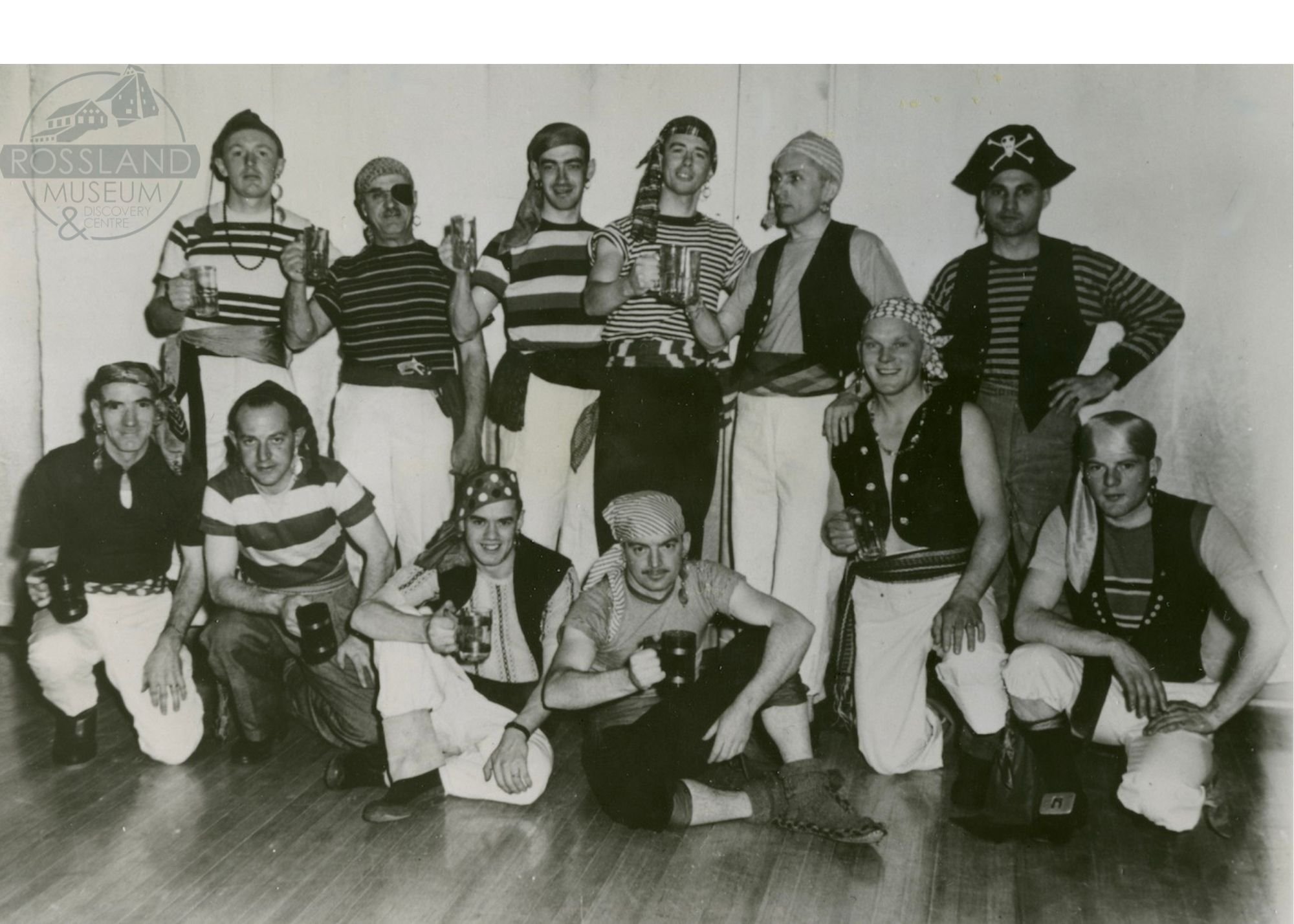

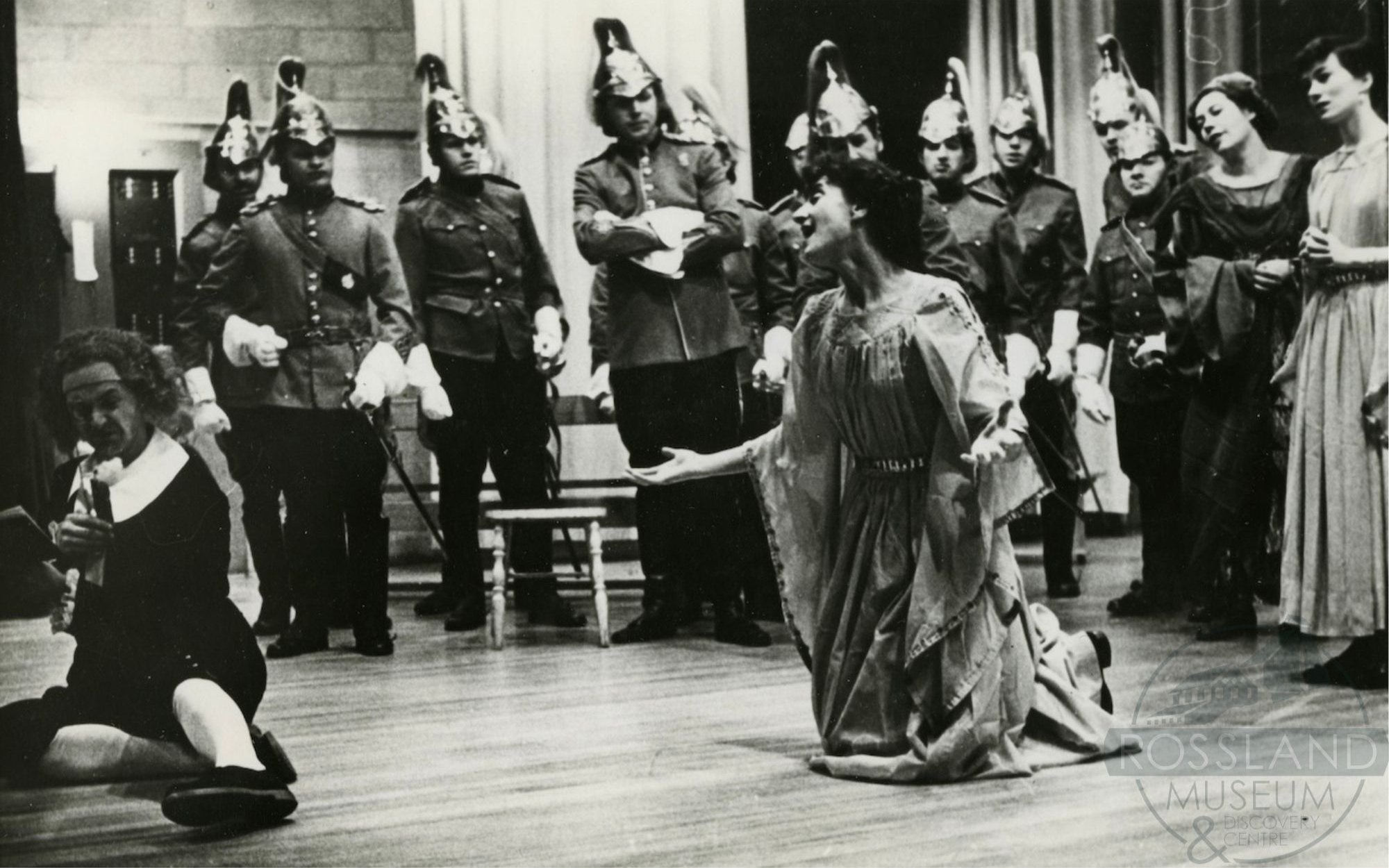
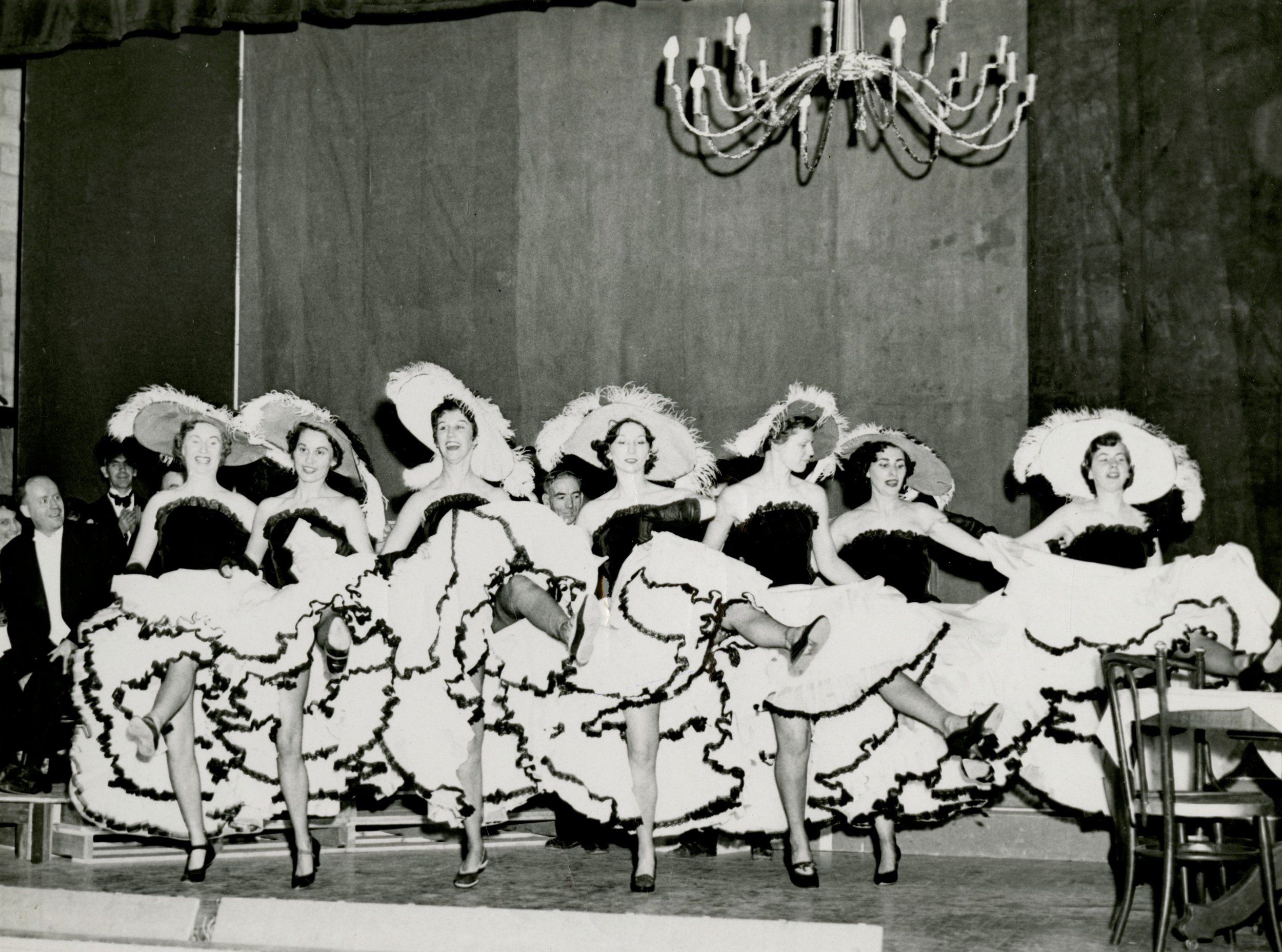
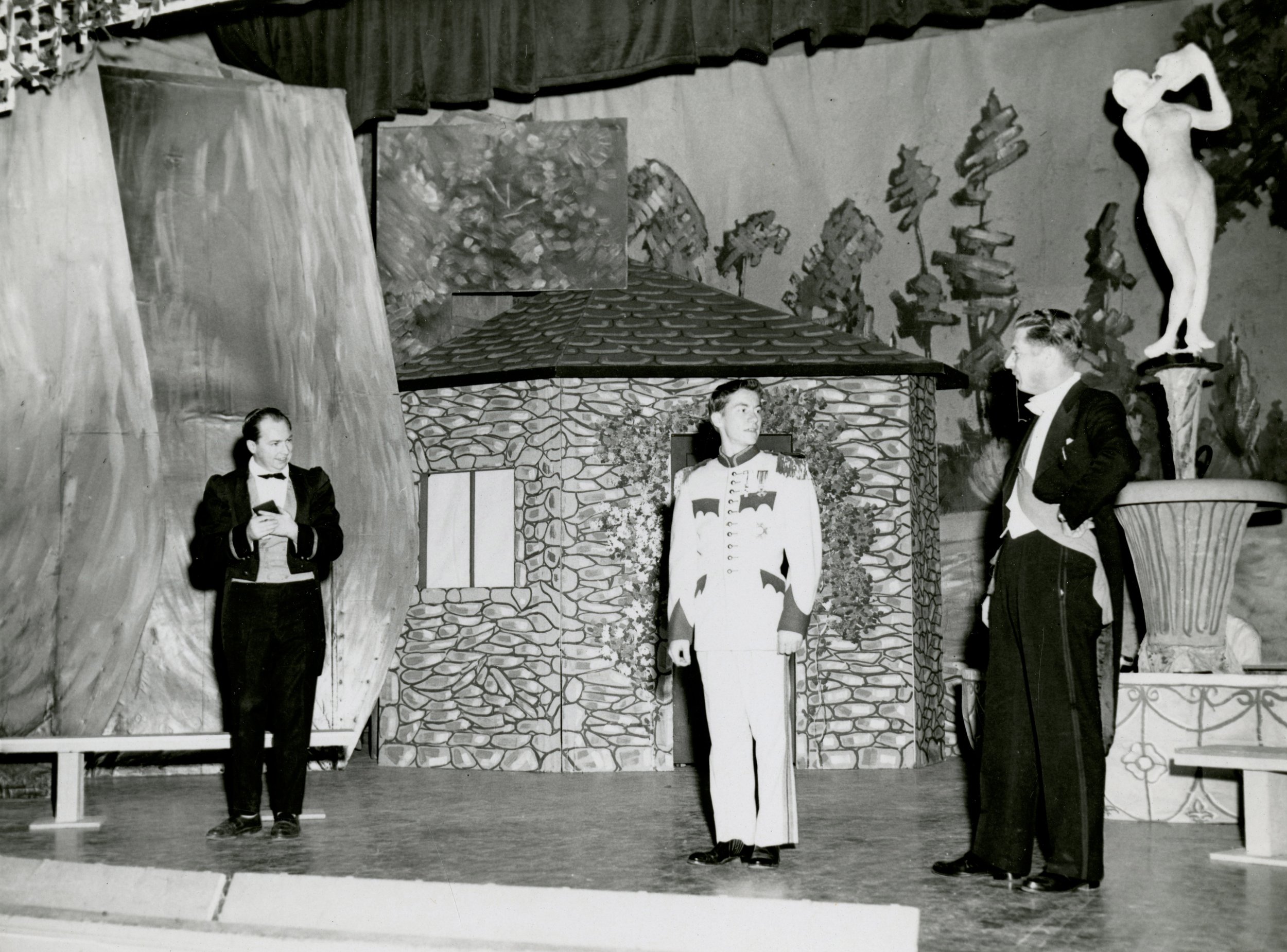

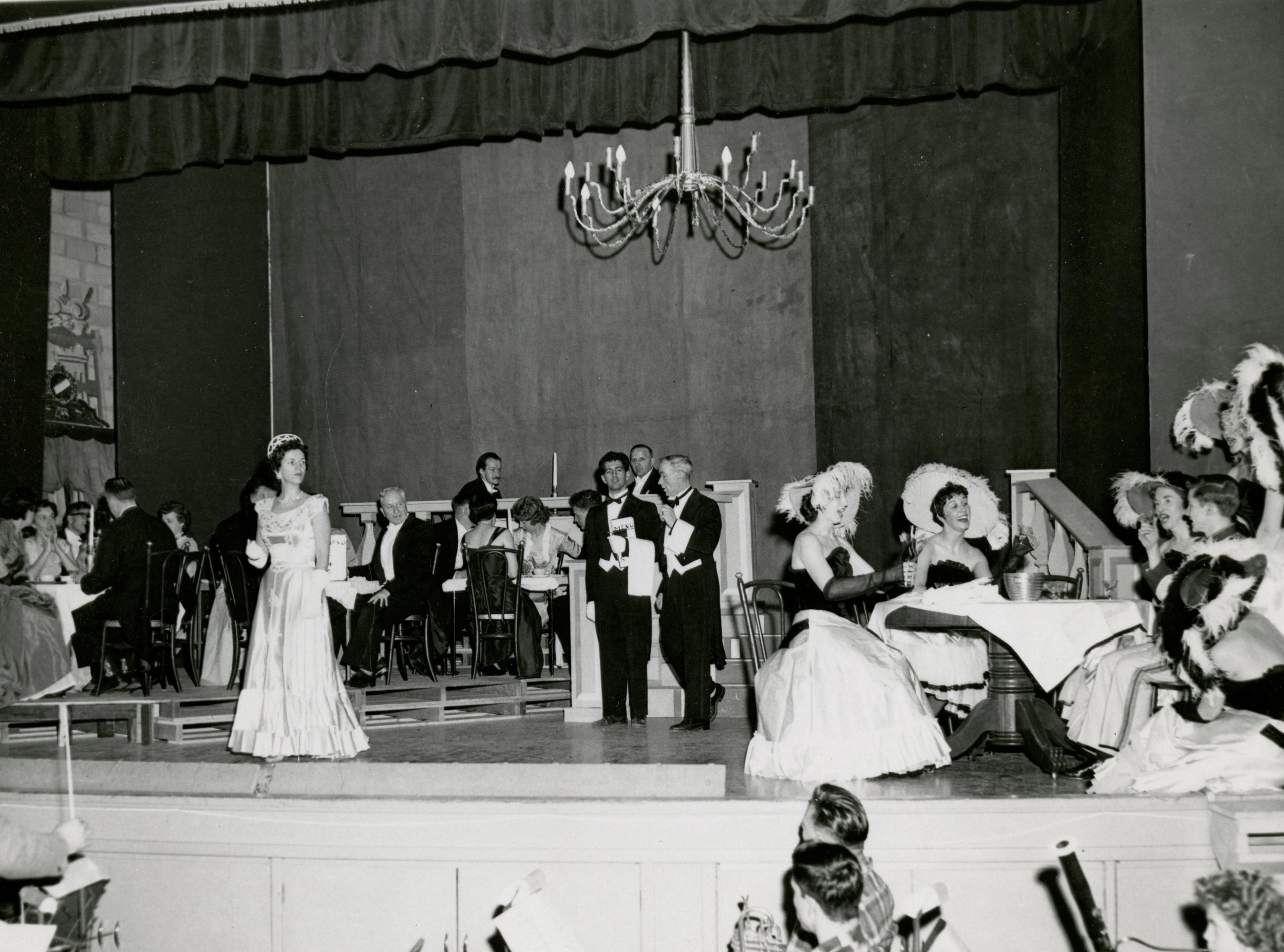
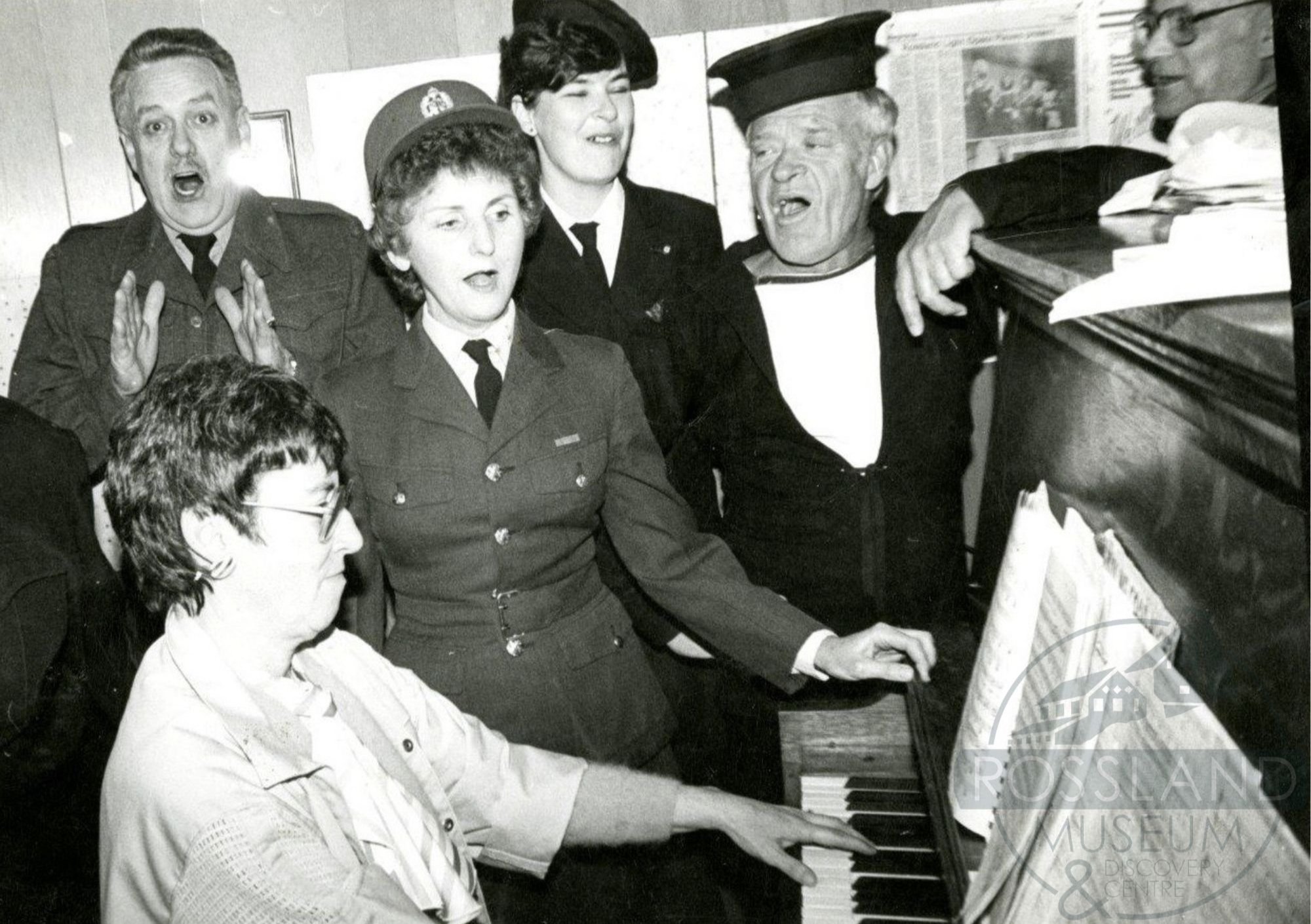
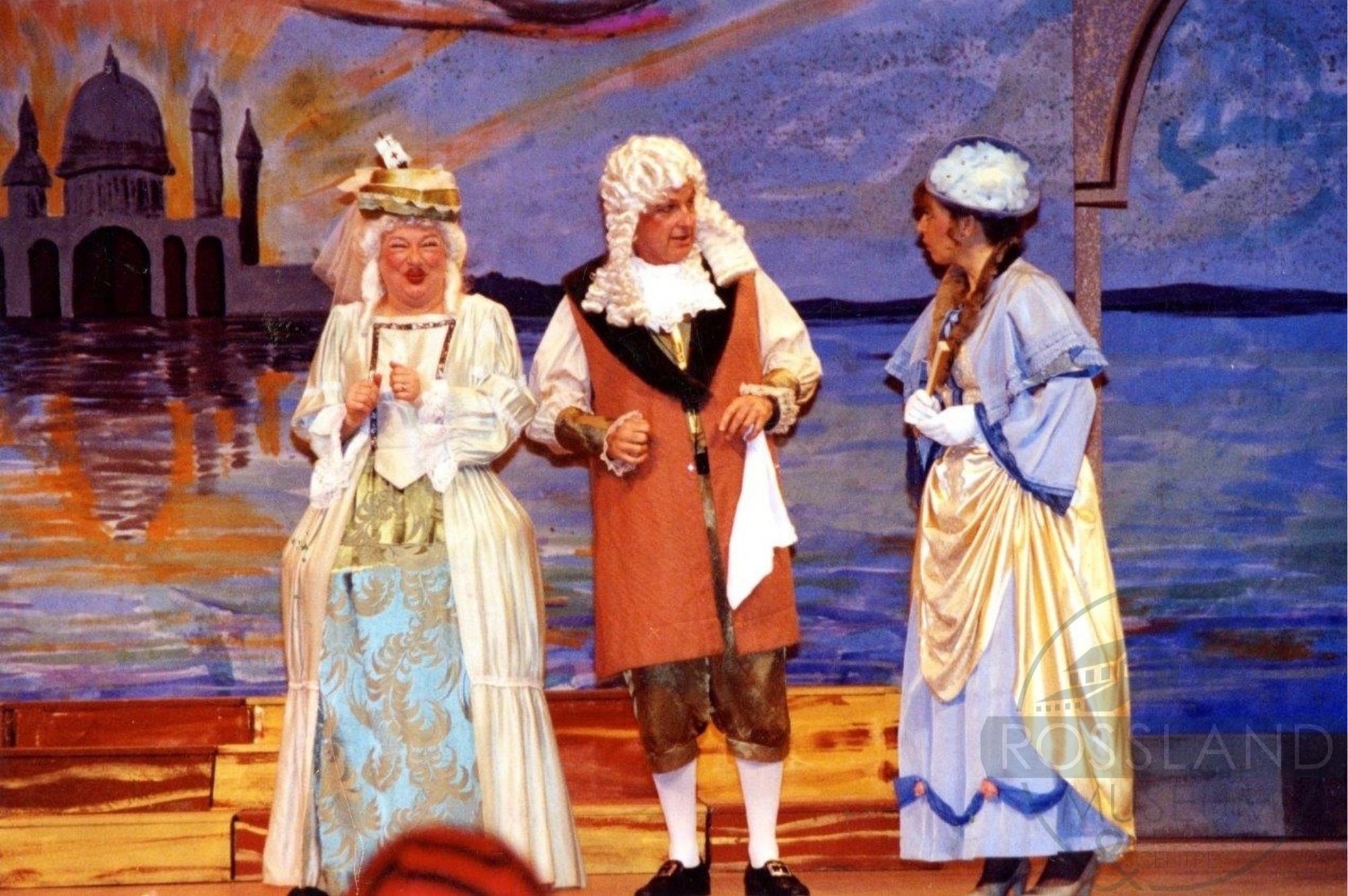
Written by Tyler Bignell
Sources:
Bank of Canada. Inflation Calculator.
Correspondence between Jaime Santano, RLOP, and Tyler Bignell, RMDC. May 5, 2022.
Fisher, Jack, Jamie Santano, and Adam Sander. Rossland Light Opera Players: The First 60 Years. Rossland: Rossland Light Opera Players, 2012.
Rossland Light Opera Players Collection. Collection of the Rossland Museum & Discovery Centre.
Rossland Light Opera Players. About RLOP.
Rossland Miner. Collection of the Rossland Museum & Discovery Centre.
Trail Daily Times. Collection of the Rossland Museum & Discovery Centre.
Development of this webpage was supported by
Contribute your own memories of the Rossland Light Opera Players:
The form below will email us your message. If you prefer to speak to us directly or have other questions or comments about this page, please call (250) 362-7722 or email the archives directly at archives@rosslandmuseum.ca.
